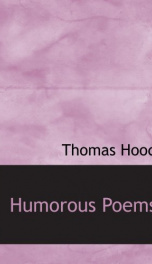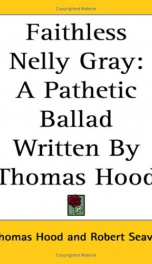Hood Thomas
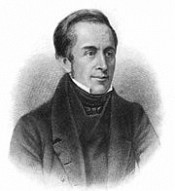
Thomas Hood (23 May 1799 – 3 May 1845) was a British humorist and poet. His son, Tom Hood, became a well known playwright and editor. He was born in London to Thomas Hood and Elizabeth Sands in the Poultry (Cheapside) above his father's bookshop. Hood's paternal family had been Scottish farmers from the village of Errol near Dundee. The Elder Hood was a partner in the business of Verner, Hood, and Sharp, and was a member of the Associated booksellers. Hood's son, Tom Hood, claimed that his grandfather had been the first to opened up the book trade with America and he had great success in new editions of old books. [1] "Next to being a citizen of the world," writes Thomas Hood in his Literary Reminiscences, "it must be the best thing to be born a citizen of the world's greatest city." On the death of her husband in 1811, Mrs Hood moved to Islington, where Thomas Hood had a schoolmaster who, appreciating his talents, "made him feel it impossible not to take an interest in learning while he seemed so interested in teaching." Under the care of this "decayed dominie", he earned a few guineas—his first literary fee—by revising for the press a new edition of Paul and Virginia. Hood left his private school master at 14 years of age and was admitted soon after into the counting house of a friend of his family, where he "turned his stool into a Pegasus on three legs, every foot, of course, being a dactyl or a spondee."; However, the uncongenial profession affected his health, which was never strong,and he began to study engraving. The exact nature and course of his study is unclear and various sources tell different stories. Reid emphasizes his work under his maternal uncle Robert Sands. [2] But no papers of apprenticeship exist and we also know from his letters that he studied with a Mr. Harris. Furthermore, Hood's daughter in her Memorials mentions her father's association with the Le Keux brothers who were successful engravers in the City.[3] The labour of engraving was no better for his health than the counting house had been, and Hood was sent to his father's relations at Dundee, Scotland. Here he stayed in the house of his maternal aunt, Jean Keay, for some months and then, after a falling out with her he moved on to the boarding house of one of her friends, Mrs Butterworth where he lived for the rest of his time in Scotland. [4] In Dundee, Hood made a number of close friends with whom he continue to correspond for many years, led a healthy outdoor life, and also became a large and indiscriminate reader. It was also during his time here that Hood began to seriously write poetry and had his first published work, a letter to the editor of the Dundee Advertiser. Before long Hood contributed humorous and poetical articles to the provincial newspapers and magazines. As a proof of his literary vocation, he used to write out his poems in printed characters, believing that that process best enabled him to understand his own peculiarities and faults, and probably unaware that Samuel Taylor Coleridge had recommended some such method of criticism when he said he thought "print settles it." On his return to London in 1818 he applied himself to engraving, enabling him later to illustrate his various humours and fancies by quaint devices. In 1821, John Scott, the editor of the London Magazine, was killed in a duel, and the periodical passed into the hands of some friends of Hood, who proposed to make him sub-editor. His installation into this post at once introduced him to the literary society of the time; and in becoming the associate of Charles Lamb, Henry Cary, Thomas de Quincey, Allan Cunningham, Bryan Procter, Serjeant Talfourd, Hartley Coleridge, the peasant-poet John Clare and other contributors to the magazine, he gradually developed his own powers. He had married in May 1824,[5] and Odes and Addresses—his first work—was written in conjunction with his brother-in-law J.H. Reynolds, a friend of John Keats. S. T. Coleridge wrote to Charles Lamb averring that the book must be his work. The Plea of the Midsummer Fairies (1827) and a dramatic romance, Lamia, published later, belong to this time. The Plea of the Midsummer Fairies was a volume of serious verse. But he was known as a humorist, and the public rejected this little book almost entirely. Hood was particularly fond of practical jokes which he was said to have enjoyed perpetrating on members of his family. In the Memorials of Thomas Hood largely written by daughter, there is a story of Hood playing one such joke on his wife. He instructs Mrs. Hood to purchase some fish for the evening meal from the woman who regularly comes to the door selling her husband’s catch. But he warns her to watch for any plaice that “has any appearance of red or orange spots, as they are a sure sign of an advanced stage of decomposition.” Of course when the fish-seller comes Mrs. Hood refuses to purchase her plaice she exclaims “My good woman… I could not think of buying any plaice with those very unpleasant red spots!” Hood was much amused by the fish-sellers expression of amazement at complete ignorance of the appearance of plaice.[6] The series of the Comic Annual, dating from 1830, was a kind of publication at that time popular, which Hood undertook and continued, almost unassisted, for several years. Under that somewhat frivolous title he treated all the leading events of the day in caricature, without personal malice, and with an under-current of sympathy. The attention of the reader was distracted, by the incessant use of puns, of which Hood had written in his own vindication: He was probably aware of this danger. As he gained experience as a writer, his diction became simpler. In another annual called the Gem appeared the poem on the story of Eugene Aram. He started a magazine in his own name, for which he secured the assistance of many literary men, but which was mainly sustained by his own activity. From a sick-bed, from which he never rose, he conducted this work, and there composed well known poems, such as the "Song of the Shirt" (which appeared anonymously in the Christmas number of Punch, 1843 and was immediately reprinted in The Times and other newspapers across Europe. It was dramatised by Mark Lemon as The Sempstress, was printed on broadsheets, cotton handkerchiefs and was highly praised by many of the literary establishment, including Charles Dickens.) Likewise "The Bridge of Sighs" and "The Song of the Labourer" which are translated into German by Ferdinand Freiligrath. They are plain, solemn pictures of conditions of life which appeared shortly before Hood's own death in May 1845. Hood was associated with the Athenaeum, started in 1828 by James Silk Buckingham, and he was a regular contributor for the rest of his life. Prolonged illness brought on straitened circumstances; and application was made by a number of Hood's friends to Sir Robert Peel to place Hood's name on the pension list with which the British state rewarded literary men. Peel was known to be an admirer of Hood's work and in the last few months of Hood's life he gave Jane Hood the sum of 100 Pounds without her husband's knowledge, to alleviate the family's debts. [7] The pension that Peel's government had bestowed upon Hood was continued to his wife and family after his death. Jane Hood, who also suffered from poor health and had expended tremendous energy tending to her husband in his last year, died only 18 months after Hood. The pension then ceased but Lord John Russell, grandfather of the philosopher Bertrand Russell, made arrangements for a fifty pound pension for the maintenance of Hood's two children, Francis and Tom.[8] Nine years later a monument, raised by public subscription, in the cemetery of Kensal Green, was inaugurated by Richard Monckton Milnes. Writer and friend of Hood, William Makepeace Thackeray, gave this assessment of Thomas Hood:"Oh sad, marvelous picture of courage, of honesty, of patient endurance, of duty struggling against pain! ... Here is one at least without guile, without pretension, without scheming, of a pure life, to his family and little modest circle of friends tenderly devoted."[9] Hood wrote humorously on many contemporary issues. One of the most important issues in his time was grave robbing and selling of corpses to anatomists (see West Port murders). On this serious and perhaps cruel issue, he wrote humorously thus: Hood’s most widely known work during his lifetime was a poem entitled The Song of the Shirt which was a lament for a poor London seamstress who had been compelled to sell shirts that she had made, the proceeds of which lawfully belonged to her employer, in order to feed her malnourished and ailing child. Hood’s poem appeared in one of the very first additions of Punch (magazine) in 1843 and quickly became a public sensation, being turned into a popular song and inspiring social activists in defense the countless laboring women who lived in abject poverty despite their constant industriousness. Below are two verses of The Song of the Shirt: The list of Hood's separately published works is as follows: Books on the Life of Hood
do you like this author?
What readers are saying
What do you think? Write your own comment on this book!
write a commentWhat readers are saying
What do you think? Write your own comment on this author!
write a commentBook list
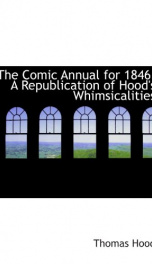
the comic annual for 1846 a republication of hoods whimsicalities
Series:
Unknown
Year:
Unknown
Raiting:
5/5
Show more
add to favoritesadd In favorites
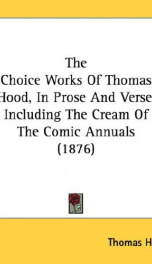
the choice works of thomas hood in prose and verse including the cream of the
Series:
Unknown
Year:
Unknown
Raiting:
4/5
Show more
add to favoritesadd In favorites

tales romances and extravaganzas
Series:
Unknown
Year:
Unknown
Raiting:
4/5
Purchase of this book includes free trial access to www.million-books.com where you can read more than a million books for free. This is an OCR edition with typos. Excerpt from book: THE CHARACTER. ' I would give ten thousand pounds for a character." Colonel Chartres. " If you plea.;e, Ma'am," said Betty, wiping her steaming arms on her apron as she entered the room, "if you please, Ma'am, here's the lady for the character." Mrs. Dowdum immediately jumped up from her chair, and with a little run, no faster than a walk, proceeded from the window to the fireplace, and consulted an old-fashioned watch which stood on the mantel-shelf. " Bless me! it is twelve o'clock, sure enough ! " Now, considering that the visit was hy appointment, and had been expected for the last hour, it will be thought remarkable that Mrs. Dowdum should be so apparently unprepared ; but persons who move in the higher circles within the vortex of what is called a perpetual round of pleasure, where visits, welcome or unwelcome, circulate with proportionate rapidity, can hardly estimate the importance of an interview in those lower spheres which, comparatively, scarcely revolve at all. Thus for the last hour Mrs. Dowdum had been looking for the promised call, a.ul listening with all her might for the sound of the knocker; and yet when it did come, she was as much flurried as people commonly are by what is denominated a drop in. Accordingly, after consulting the watch, she found it necessary to refer to the looking-glass which hung above it, and to make an extempore toilet First, she laid hold of her cap with both hands, and gave it her flaxen wig following the impulse what sailors term a half turn to the right, after which she repeated the same manrenvre towards the left; and then, as if by this operation she had discovered the juste milieu, she left matters as they were. Her shawl was next treated in the same fashion, first being lapped over one way, and then lapped o...
Show more
add to favoritesadd In favorites
Book list

the comic annual for 1846 a republication of hoods whimsicalities
Series:
Unknown
Year:
Unknown
Raiting:
5/5
Show more
add to favoritesadd In favorites

the choice works of thomas hood in prose and verse including the cream of the
Series:
Unknown
Year:
Unknown
Raiting:
4/5
Show more
add to favoritesadd In favorites

tales romances and extravaganzas
Series:
Unknown
Year:
Unknown
Raiting:
4/5
Purchase of this book includes free trial access to www.million-books.com where you can read more than a million books for free. This is an OCR edition with typos. Excerpt from book: THE CHARACTER. ' I would give ten thousand pounds for a character." Colonel Chartres. " If you plea.;e, Ma'am," said Betty, wiping her steaming arms on her apron as she entered the room, "if you please, Ma'am, here's the lady for the character." Mrs. Dowdum immediately jumped up from her chair, and with a little run, no faster than a walk, proceeded from the window to the fireplace, and consulted an old-fashioned watch which stood on the mantel-shelf. " Bless me! it is twelve o'clock, sure enough ! " Now, considering that the visit was hy appointment, and had been expected for the last hour, it will be thought remarkable that Mrs. Dowdum should be so apparently unprepared ; but persons who move in the higher circles within the vortex of what is called a perpetual round of pleasure, where visits, welcome or unwelcome, circulate with proportionate rapidity, can hardly estimate the importance of an interview in those lower spheres which, comparatively, scarcely revolve at all. Thus for the last hour Mrs. Dowdum had been looking for the promised call, a.ul listening with all her might for the sound of the knocker; and yet when it did come, she was as much flurried as people commonly are by what is denominated a drop in. Accordingly, after consulting the watch, she found it necessary to refer to the looking-glass which hung above it, and to make an extempore toilet First, she laid hold of her cap with both hands, and gave it her flaxen wig following the impulse what sailors term a half turn to the right, after which she repeated the same manrenvre towards the left; and then, as if by this operation she had discovered the juste milieu, she left matters as they were. Her shawl was next treated in the same fashion, first being lapped over one way, and then lapped o...
Show more
add to favoritesadd In favorites

odes and addresses to great people
Series:
Unknown
Year:
Unknown
Raiting:
4/5
Purchase of this book includes free trial access to www.million-books.com where you can read more than a million books for free. This is an OCR edition with typos. Excerpt from book: If. Speak up!or hath he hid his name To crawl thro' " subways'" unto fame, Like Williams of Cornhill ? Speak up, my lad!when men run small We'll show what's little in them all, Receive it how they will! Think now of Irving!shall he preach The princes down,shall he impeach The potent and the rich, Merely on ethic stilts,and I Not moralize at two miles high The true didactic pitch ! ,. Come:what d'ye think of Jeffrey, sir ? Is Gifford such a Gulliver In Lilliput's Review, That like Colossus he should stride Certain small brazen inches wide For poets to pass through ? Look down! the world is but a spot. Now sayIs Blackwood's low or not, For all the Scottish tone ? It shall not weigh us herenot where The sandy burden's lost in air Our ladingwhere is't flown ? Now,like you Croly's verse indeed In heavenwhere one cannot read The " Warren" on a wall ? What think you here of that man's fame ? Tho' Jerdan magnified his name, To me 'tis very small! 22. And, truly, is there such a spell In those three letters, L. E. L., To witch a world with song? On clouds the Byron did not sit, Yet dar'd on Shakspeare's head to spit, And say the world was wrong! And shall not we ? Let's think aloud ! Thus being couch'd upon a cloud, Graham, we'll have our eyes ! We felt the great when we were less, Buf we'll retort on littleness Now we are in the skies. 24. . 0 Graham, Graham, how I blame The bastard blush,the petty shame, That used to fret me quite, The little sores I cover'd then, No sores on earth, nor sorrows when The world is out of sight ! My name is Tims.I am the man That North's unseen diminish'd clan So scurvily abused ! 1 am the very P. A. Z. The London's Lion's small pin's head So...
Show more
add to favoritesadd In favorites
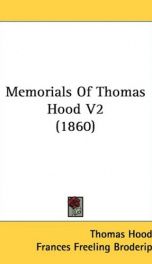
memorials of thomas hood
Series:
Unknown
Year:
Unknown
Raiting:
5/5
In Two Volumes. This scarce antiquarian book is included in our special Legacy Reprint Series. In the interest of creating a more extensive selection of rare historical book reprints, we have chosen to reproduce this title even though it may possibly have occasional imperfections such as missing and blurred pages, missing text, poor pictures, markings, dark backgrounds and other reproduction issues beyond our control. Because this work is culturally important, we have made it available as a part of our commitment to protecting, preserving and promoting the world's literature. --This text refers to the Paperback edition.
Show more
add to favoritesadd In favorites

hoods own or laughter from year to year being former runnings of his comic ve
Series:
Unknown
Year:
Unknown
Raiting:
5/5
Show more
add to favoritesadd In favorites

hoods own or laughter from year to year being former runnings of his comic v
Series:
Unknown
Year:
Unknown
Raiting:
5/5
Show more
add to favoritesadd In favorites
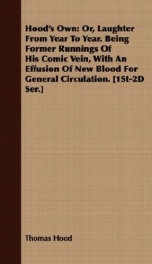
hoods own or laughter from year to year being former runnings of his comic
Series:
Unknown
Year:
Unknown
Raiting:
4/5
Many of the earliest books, particularly those dating back to the 1900s and before, are now extremely scarce and increasingly expensive. We are republishing these classic works in affordable, high quality, modern editions, using the original text and artwork.
Show more
add to favoritesadd In favorites

hoods own or laughter from year to year being a further span classsearch
Series:
Unknown
Year:
Unknown
Raiting:
5/5
Show more
add to favoritesadd In favorites
What readers are saying
What do you think? Write your own comment on this author!
write a commentif you like Hood Thomas try:
readers also enjoyed
What readers are saying
What do you think? Write your own comment on this author!
write a commentGenre
if you like Hood Thomas try:
readers also enjoyed
Do you want to read a book that interests you? It’s EASY!
Create an account and send a request for reading to other users on the Webpage of the book!

